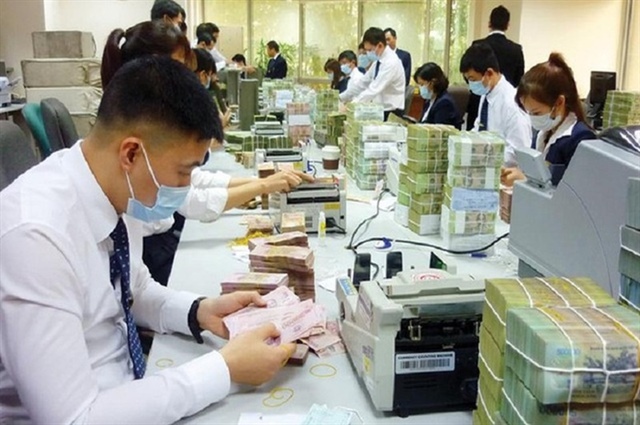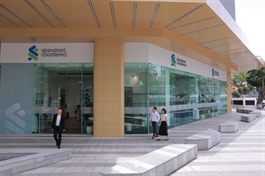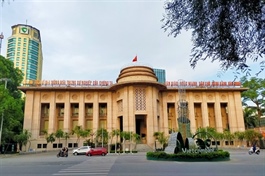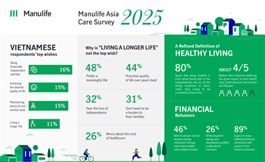Amended Law on Credit Institution is positive for banks, say analysts
Amended Law on Credit Institution is positive for banks, say analysts
The National Assembly last Friday approved revisions to the 2024 Credit Institution Law, significantly strengthening banks’ ability to recover bad debts and empowering the State Bank to intervene more effectively in struggling financial institutions.

The revised law restores banks’ legal authority to seize undisputed collateral, including in certain criminal cases — a critical tool previously enabled by Resolution 42/2017/QH14. Photo baochinhphu.vn |
The newly-issued amended Law on Credit Institution is positive for banks in Việt Nam, as it helps enhance bad debt recovery and regulatory intervention, according to analysts.
The National Assembly last Friday approved revisions to the 2024 Credit Institution Law, significantly strengthening banks’ ability to recover bad debts and empowering the State Bank of Vietnam (SBV) to intervene more effectively in struggling financial institutions.
Phan Duy Hưng, director and senior analyst of Vietnam Investors Service, an affiliate of Moody’s Rating, said: “The revised law restores banks’ legal authority to seize undisputed collateral, including in certain criminal cases — a critical tool previously enabled by Resolution 42/2017/QH14.”
Resolution 42, which took effect from 2017 to 2023, piloted a programme on handling bad debt for credit institutions. The newly-issued revised Credit Institution Law included some provisions from Resolution 42.
“When the resolution expired in December 2023, the recovery of collateral from banks' bad debts depended on customers' cooperation or through lengthy litigation, causing the debt recovery rate at banks to plummet,” Hưng said.
According to Hưng, while it was in effect, Resolution 42 boosted monthly bad debt resolutions by 65 per cent and increased voluntary repayments to 36 per cent of total bad debts, up from 23 per cent over the five years prior to its introduction. Its expiration in December 2023 left banks reliant on borrower cooperation or protracted legal proceedings, sharply reducing recovery rates.
In H1 2024, banks addressed nearly half of their bad debts through provisioning and write-offs, accounting for 30-40 per cent of their total equity on average. Coupled with the sluggish real estate market, bad debt recovery income also declined from 40 per cent of total write-offs in 2021-2022 to 27 per cent in 2024. In addition, according to several banks including VPB, less than 30 per cent of bad debts were taken to the courts for resolution. Court proceedings can also take up to seven years.
The revised law now reinstates banks' rights to seize collateral, facilitating quicker debt collection and improving asset quality and profitability, particularly for retail-focused banks with limited exposure to speculative projects.
From 2022 to 2025, problem loan ratios at banks including ACB, HDB, OCB, VIB, VPB and MBB rose from an average of 1.6 per cent to 2.2 per cent, driven by real estate-backed mortgages and retail business loans.
While residential real estate liquidation was supported by robust demand, banks faced challenges with hospitality-related collateral assets due to oversupply and cautious market sentiment.
Crucially, the revised Law on Credit Institution also authorises the SBV to issue special loans at 0 per cent interest to distressed banks, enabling earlier regulatory intervention and reinforcing financial system stability.
“We expect this legal reform will support bank profitability through improved debt recovery and lower operational costs, aided by a rebound in real estate transactions in 2025,” Hưng said.
Head of the PYN Elite Fund Petri Deryng said that the legalisation of bad debt settlement in the amended Credit Institution Law is an important issue for the banking industry that will help some banks record additional income as early as the end of 2025.
According to PYN Elite Fund, the new regulations will allow banks to liquidate collateral from bad debts without having to go through a complicated and lengthy legal process. In case of customers' insolvency, banks will gain control of the collateral faster. This allows banks to record additional income from selling collateral sooner. Previously, the process of liquidating collateral was very complicated and could take several years.
Analysts from Maybank Investment Bank agreed, adding that the legalisation of Resolution 42 is a necessary policy for the banking industry, helping banks seize collateral and proactively handle it.
According to the Maybank analysts, the current bad debt situation in the banking industry is not too serious and is gradually improving with the recovery of the economy. The legalisation of Resolution 42 will therefore help perfect the legal framework to support the stable operation of the banking industry.
After the law is passed, the Government is expected to direct the SBV and relevant agencies to issue guiding documents to implement it, ensuring that the law's provisions are put into practice as quickly and effectively as possible.
- 08:55 01/07/2025






























